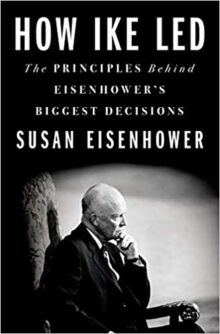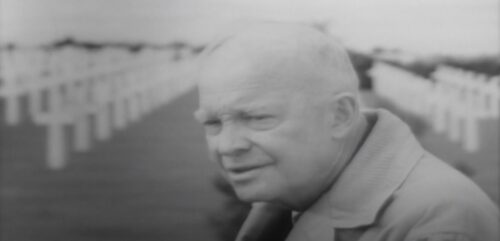
International business consultant and policy analyst Susan Eisenhower’s new book about her grandfather, How Ike Led: The Principles Behind Eisenhower’s Biggest Decisions, describes how Ike’s heritage and upbringing—along with, relatedly, his character and discipline—informed his judgement and helped make him such a steadying force throughout his military and political career at the top of the U.S. government. Philanthropy can and should learn from how he led, and from his profound respect for those who’ve preceded us.
The book’s publication, during the 75th year after the end of World War II, and its reception remind us of a short Giving Review piece about Ike earlier this year, so we’re featuring a revised version of it below. It originally appeared on July 2, 2020.
Sitting among the many headstone monuments on the beaches of Normandy 20 years after the D-Day invasion, former President and retired U.S. Army Gen. Dwight Eisenhower told CBS News’ Walter Cronkite what he remembered about the day, those who died then, and what their deaths meant, and mean.
[caption id="attachment_72559" align="alignnone" width="500"] Ike (YouTube)[/caption]
Ike (YouTube)[/caption]
“Walter, this D-Day has a very special meaning for me, and I’m not referring merely to the anxieties of the day—anxieties that were a natural part of sending in an invasion where you knew that many hundreds of boys were going to give their lives or be maimed forever,” Eisenhower begins, at about 1:15.15 into the YouTube video of the CBS Reports program.
Seeing the rows and rows of stones, he was reminded of his son John, Susan’s father.
My mind goes back so often to this fact: on D-Day, my own son graduated from West Point. And after his training with his division, he came over with the 71st Division, but that was some time after this event. But on the very day he was graduating, these men came here—British, and our other allies, and Americans—to storm these beaches for one purpose only: not to gain anything for ourselves, not to fulfill any ambitions that America had for conquest, but just to preserve freedom, systems of self-government in the world. Many thousands of men have died for ideals such as these. And here again, in the 20th Century, for the second time, Americans—along with the rest of the field, but Americans—had to come across the ocean to defend those values.
Amidst the memorials, Eisenhower—fittingly—remembered.
Now my own son has been very fortunate. He has had a very full life since then. He is a father of four lovely children that are very precious to my wife and me. But these young boys, so many of them—over whose graves we have been treading, looking at, wondering and contemplating about their sacrifices—they were cut off in their prime. They have families that grieve for them. But they never knew the great experiences of going through life like my son can enjoy.
The monuments, Ike knew, had meaning. In front of them—typically understatedly, but stirringly—he said,
I devoutly hope we will never again have to see such scenes as these. I think and hope, pray, that humanity will have learned more than we had learned up until that time. But these people gave us a chance, and they bought time for us, so that we can do better than we have before.
So every time I come back to these beaches—or indeed even any day that I think about that day, 20 years ago now—I say, once more: we must find some way to work for peace, and really to gain an eternal peace for this world.
Our predecessors; a chance.